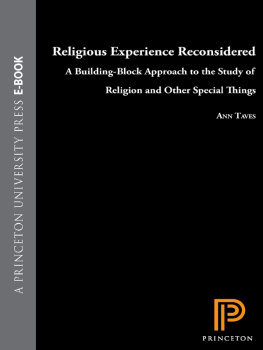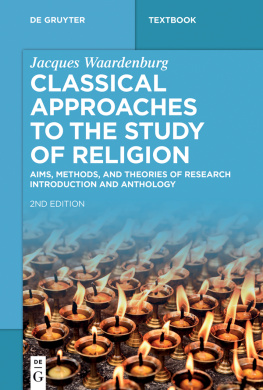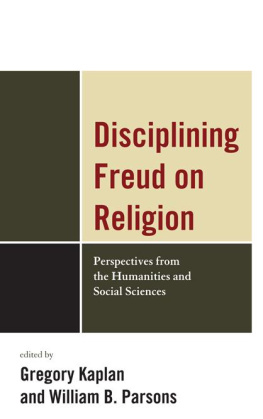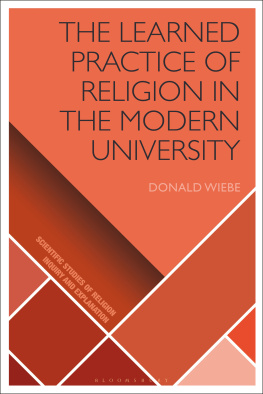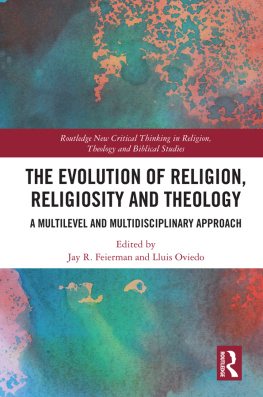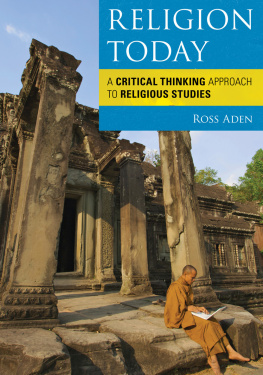Acknowledgments
Although I have been preoccupied with the problem of religious experience for some time, the decision to write this particular book emerged in the wake of the Evolution of Religion Conference held in Hawaii in January 2007, where I was asked to give one of the plenary addresses. I am grateful to Joseph Bulbulia, Armin Geertz, and the other members of the organizing committee for providing an occasion for articulating my thoughts about studying religious experience. I am also grateful to colleagues who provided important feedback on early drafts of chapters, including Tom Tweed and Ilkka Pyysiinen on and with the bibliography. Bill Christian, visiting professor at the University of California, Santa Barbara, during Spring Quarter, enthusiastically plied me with examples of singularization and special things, and a conference on Religious Ritual, Cognition, and Culture at the University of Aarhus in May 2008 provided the occasion for further testing and revision of these ideas.
Special thanks are due to Fred Appel, my editor at Princeton University Press, and my husband, Ray Paloutzian, both of whom have read, edited, and commented on numerous drafts of every chapter. Fred, as the Press's senior editor for religion, music, and anthropology, made sure that the book was intelligible to humanists, while Ray, as a psychologist and a journal editor, did the same for the scientists. As an editorial tag team that saw eye to eye on questions of style, their concerted efforts made this a vastly more readable book. Several colleagues also read the whole manuscript and provided detailed feedback, including Catherine L. Albanese, my department chair, and two readers for Princeton University Press, one of whom was Tanya Luhrmann. Their suggestions, which I have done my best to incorporate in the final draft, polished it yet further. I would also like to thank my production editor, Heath Renfroe, and copyeditor, Jon Munk, for the skill and care with which they moved the manuscript through production.
Since Ray and I met just as I was starting to write and married days after the first draft was completed, I am grateful to him for much more than reading and editing. As my companion and conversation partner in all aspects of life, I dedicate this book to him.
APPENDIX A
General Attribution Theory of Religion
(Spilka, Shaver, and Kirkpatrick 1985)
A.1. People seek to explain experiences and events by attributing them to causesthat is, by making causal attributions.
C.1.1. Often, an event or experience has many possible and perhaps compatible causes, in which case the attributor's task is to choose among them or rank them in terms of relative importance or causal impact.
C.1.2. In cases where the presumed causal agent is a human or humanlike actor, attributions are frequently made to some enduring trait(s) or other characteristic(s) of the actor.
C.1.3. In cases where the presumed causal agent is an actor, attributions are frequently made to the actor's reason(s) or intention(s).
A.2. The attribution process is motivated by (1) a need or desire to perceive events in the world as meaningful, (2) a need or desire to predict or control events, and (3) a need or desire to protect, maintain, and enhance one's self-concept and self-esteem.
C.2.1. Attributional activity consists in part of an individual's attempt to understand events and interpret them in terms of some broad meaning-belief system.
C.2.2. Attributional activity consists in part of an individual's attempt to maintain effective control over events and experiences, in order to increase the probability of positive outcomes and avoid negative outcomes.
C.2.3. Attributional activity consists in part of an individual's attempt to maintain personal security and a positive self-concept, including a general striving toward self-enhancement and the protection of both the physical self and the self-concept against threat.
A.3. Attributional processes are initiated when events occur that (1) cannot be readily assimilated into the individual's meaning-belief system, (2) have implications regarding the controllability of future outcomes, or (3) significantly alter self-esteem either positively or negatively.
A.4. Once the attribution process has been engaged, the particular attributions chosen will be those that best (1) restore cognitive coherence to the attributor's meaning-belief system, (2) establish a sense of confidence that future outcomes will be satisfactory or controllable, and (3) minimize threats to self-esteem and maximize the capacity for self-enhancement.
A.5. The degree to which a potential attribution will be perceived as satisfactory (and hence likely to be chosen) will vary as a function of (1) characteristics of the attributor, (2) the context in which the attribution is made, (3) characteristics of the event being explained, and (4) the context of the event being explained.
A.6. Systems of religious concepts offer individuals a variety of meaning-enhancing explanations of eventsin terms of God, sin, salvation, and so forthas well as a range of possibilities for enhancing feelings of control and self-esteem (for example, personal faith, prayer, rituals, and so forth).
C.6.1. Systems of religious concepts provide individuals with a comprehensive, integrated meaning-belief system that is well adapted to accommodate and explain events in the world.
C.6.2. Systems of religious concepts satisfy the individual's need or desire to predict and control events, either through mechanisms for directly influencing future outcomes (extrinsic form) or through suspension or relinquishing of the need for direct control (intrinsic form).
C.6.3. Systems of religious concepts possess a variety of means for the maintenance and enhancement of self-esteem, including unconditional positive regard, conditional positive regard, and opportunities for spiritual growth and development.
D.1. The likelihood of choosing a religious rather than a nonreligious attribution for a particular experience or event is determined in part by dispositional characteristics of the attributor such as (1) the relative availability to that person of religious and naturalistic meaning-belief systems, (2) beliefs about the relative efficacy of religious and naturalistic mechanisms for controlling events, and (3) the relative importance of religious and naturalistic sources of self-esteem.
D.2. The attributor's context influences the relative likelihood of a religious rather than a nonreligious attribution by temporarily altering (1) the relative availability of the two meaning-belief systems, (2) the attributor's perception of the efficacy of religious versus naturalistic control mechanisms, or (3) the relative salience of these competing sources of self-esteem.
D.3. Characteristics of events that influence the choice between religious and nonreligious attributions include (1) the degree to which the event to be explained is congruent with the individual's meaning-belief systems, (2) the degree to which religious and naturalistic mechanisms for controlling similar events are seen to be effective, and (3) the degree to which religious and naturalistic explanations represent potential sources of self-esteem.
D.4. The context in which a to-be-explained event occurs influences the likelihood of religious versus naturalistic attributions by (1) affecting the relative plausibility or availability of various explanations, (2) providing information about the efficacy of various mechanisms for potentially controlling similar events, and/or (3) influencing the degree to which the events impacts on the attributor's self-esteem.
APPENDIX B
Personal Accounts of Stephen Bradley and William Barnard
(James 1902/1985, 15760; Barnard 1997, 12629)

